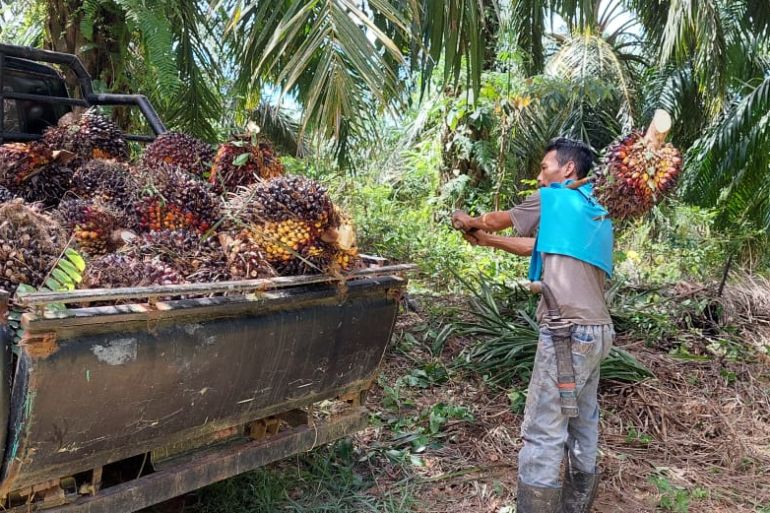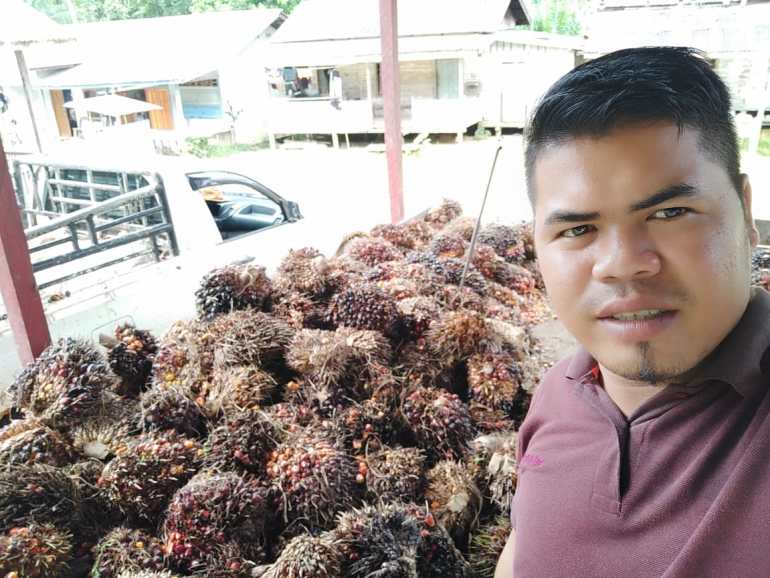Indonesian farmers decry palm oil export ban as prices plummet
Small-scale farmers say Jakarta’s ban on palm oil exports has thrown their livelihoods into jeopardy.

Medan, Indonesia – Indonesia, the world’s largest producer of palm oil, has struggled with rising prices and low stocks of cooking oil amid a surge in global prices of the raw ingredient.
Citing the need to control the price spikes, which have been exacerbated by the Ukraine war, disappointing harvests and the COVID-19 pandemic, Indonesian President Joko “Jokowi” Widodo announced in April a ban on exports of palm oil and palm oil products.
Keep reading
list of 4 itemsAfter reopening, Thailand’s battered tourism struggles to rebuild
Australia PM defends housing pitch as election looms
Billionaire Adani to buy Holcim’s India cement biz for $10.5bn
But far from calming the domestic market, Indonesian farmers who spoke to Al Jazeera say the ban has caused prices of palm fruit to plummet and thrown their livelihoods into jeopardy. Below are the responses of six farmers who spoke about their experiences with the ban. Their remarks have been lightly edited for brevity and clarity.
Mansuetus Darto, head of the Indonesian Oil Palm Farmers’ Union, West Java:
The effect of the export ban on small scale farmers has been enormous because many of them do not have other sources of income. So many farmers have struggled, especially in the last two years. They had hoped things were starting to improve after the pandemic, but if there are local or global political problems, it will affect them too. Everyone has struggled since 2020 when the pandemic started and now there is a new problem.
The issue is that Jokowi was facing an in-country problem, especially in the run-up to the Eid al-Fitr holiday when the prices of foodstuffs usually rise every year. As cooking oil prices had been rising for months, he thought the best thing to do would be to enact the ban. But the export ban isn’t going to act as a permanent solution to stabilise prices, and we immediately saw issues after the ban, like illegal exports happening because of corruption within the industry.
The irony for farmers is that they now have to sell fresh fruit bunches at low prices and then buy cooking oil at high prices. We need more refineries in Indonesia and we need to stop the monopoly of the palm oil companies in Indonesia.
Valens Andi, head of the Farmers’ Hope Oil Palm Plantation Cooperative, West Kalimantan:
It is getting more and more difficult for farmers with all these changes in the prices. Some feel as if 50 percent of their livelihood has been lost as the prices of the fresh fruit bunches have been slashed and, at the same time, the prices of fertiliser and pesticides have risen by more than 100 percent.
Oil palm farmers use chemical fertilizer and the ingredients are imported from abroad and mixed here. We have been told by fertiliser suppliers that it is getting more and more difficult to get the raw ingredients, which is why the prices of chemical fertiliser have risen.
We hope that prices of fresh fruit bunches will stabilise and be standardised in line with the minimum wage in each province. We need to make sure that everybody is getting a decent price.
Iwan Himawan, farmer of two hectares of oil palm, East Kalimantan:
I have two hectares of land and produce one to one and a half tonnes of palm fruit every harvest, which happens every 20 days.
We have really felt the effects of the export ban. When Jokowi gave his speech on April 22 to announce the ban, the price immediately plummeted. That was before the ban even came into effect on April 28, and after that things got even worse.
Here in East Kalimantan, we used to get 3,000 Indonesian rupiah ($0.21) per kilo for our fresh fruit bunches, but now the price has dropped to 1,700 rupiah ($0.12) per kilo, so it’s a really big difference.
The governor of East Kalimantan put out a letter to say that factories shouldn’t lower the price [that they buy] palm oil fruit [at] any more but many of them have just ignored it as they buy through middlemen.

Yusro Fadly, farmer of two hectares of oil palm, Riau:
I used to sell my fruit for 3,900 rupiah ($0.27) per kilo but now the price has gone down to 1,800 rupiah ($0.12) per kilo if you sell to wholesalers. The official price set by the government for fresh fruit bunches is 2,947 rupiah ($0.20) per kilo.
The factories buying the fresh fruit bunches have yet to set limits on how much they will buy, but there are long lines outside factories as farmers are worried that the prices will drop even further and want to sell their fruit as soon as possible.
We can’t take care of our plantations properly any more as the price of fertilizer has risen by 300 percent and there has been no explanation from the government about why this has happened.
It used to cost 300,000 rupiah ($20.51) for 50 kilograms of fertiliser but now it costs more than 1 million rupiah ($68). Where can you find a smallholder palm oil farmer who is going to be able to take care of their fields if the price of palm fruit is going down but the price of fertilizer is soaring?
Vincentius Haryono, farmer of four hectares of oil palm, Jambi:
Before the ban, we would sell our palm fruit for 3,600 to 3,800 rupiah ($0.25-$0.26) per kilogramme. Now the price has gone down to 2,210 rupiah ($0.15) per kilogramme.
I want to talk about the psychological effect of the ban on smallholder farmers. We feel so disappointed and of course, we blame the government for taking this decision and not thinking about us farmers on the ground. Why did the government do this to us? We feel as if we have been the victims of the export ban. An export ban of one week should have been enough for domestic supply to be stabilised again.
Smallholder farmers don’t want to accept this has happened. Farmers have been forced to accept lower and lower prices for our palm fruit and, in addition to the price of fertilizer rising, the price of pesticides has also doubled. We are now losing money and not making any profit.
State-owned palm oil enterprises can fulfill domestic supplies of cooking oil or at least around 70 percent of supplies. The government should focus on these first to sort out domestic supply and not touch the private sector. Let us sell our palm fruit and let businesses export crude palm oil and other palm oil products if they want to.

Albertus Wawan, farmer of five hectares of oil palm, West Kalimantan:
The government needs to find a solution for smallholder oil palm farmers. They need to immediately reverse the export ban or, if they’re not going to do that, they need to find another solution. In the beginning, when the ban was first announced, it didn’t include crude palm oil but the factories started to drop their prices anyway.
The challenge in the field is all the operational costs that we have. The price of pesticides and fertilizers is now no longer equal to the profits that we’re making. We used to make about 4,000 rupiah ($0.27) per kilogram for our fresh fruit bunches in West Kalimantan because we are in quite a remote area, and now the price has dropped to about 2,000 rupiah ($0.14). We don’t want to make a big deal about the price of oil palm fruit, we just want it to be fair.
There are 270 million people in Indonesia and 16 million smallholder oil palm farmers who have been victims of this ban. Don’t just let the ban be shock therapy for the market while damaging our livelihoods. Our hope is that the price will rise again, but there is a limit to farmers’ patience and they are not going to want to harvest any more and it is going to cause social problems if the ban lasts much longer. How are people meant to pay for their daily needs? How are they going to send their children to school? How are they going to buy groceries?